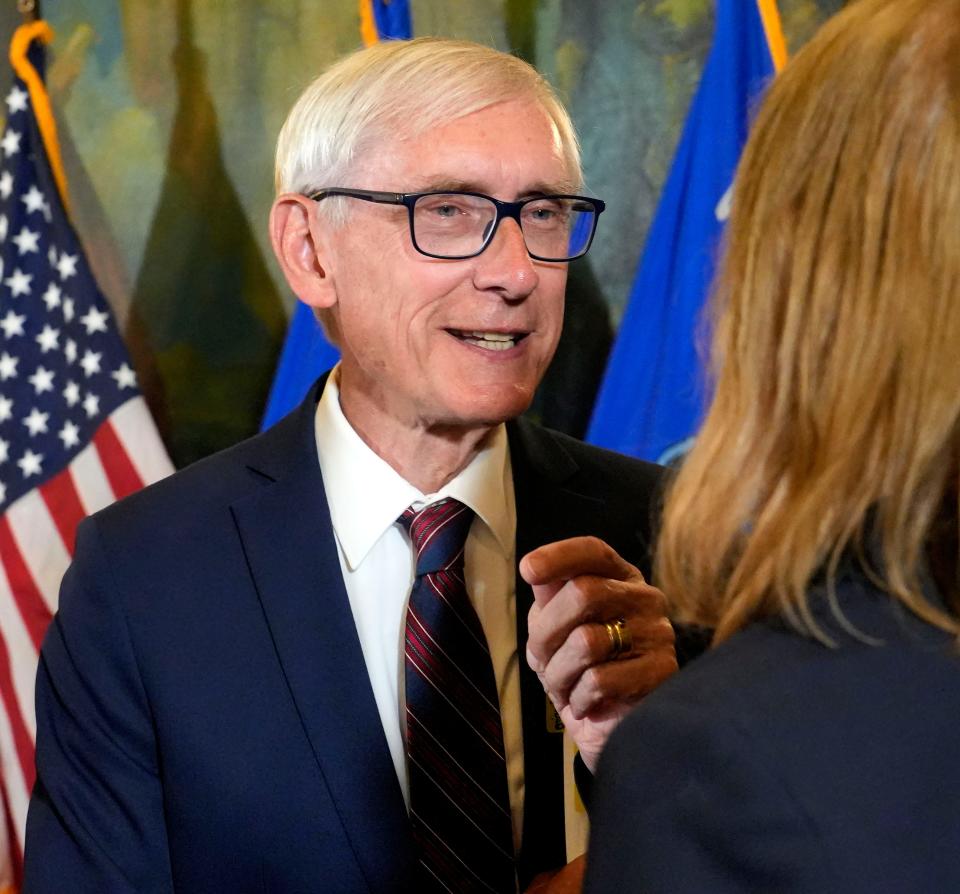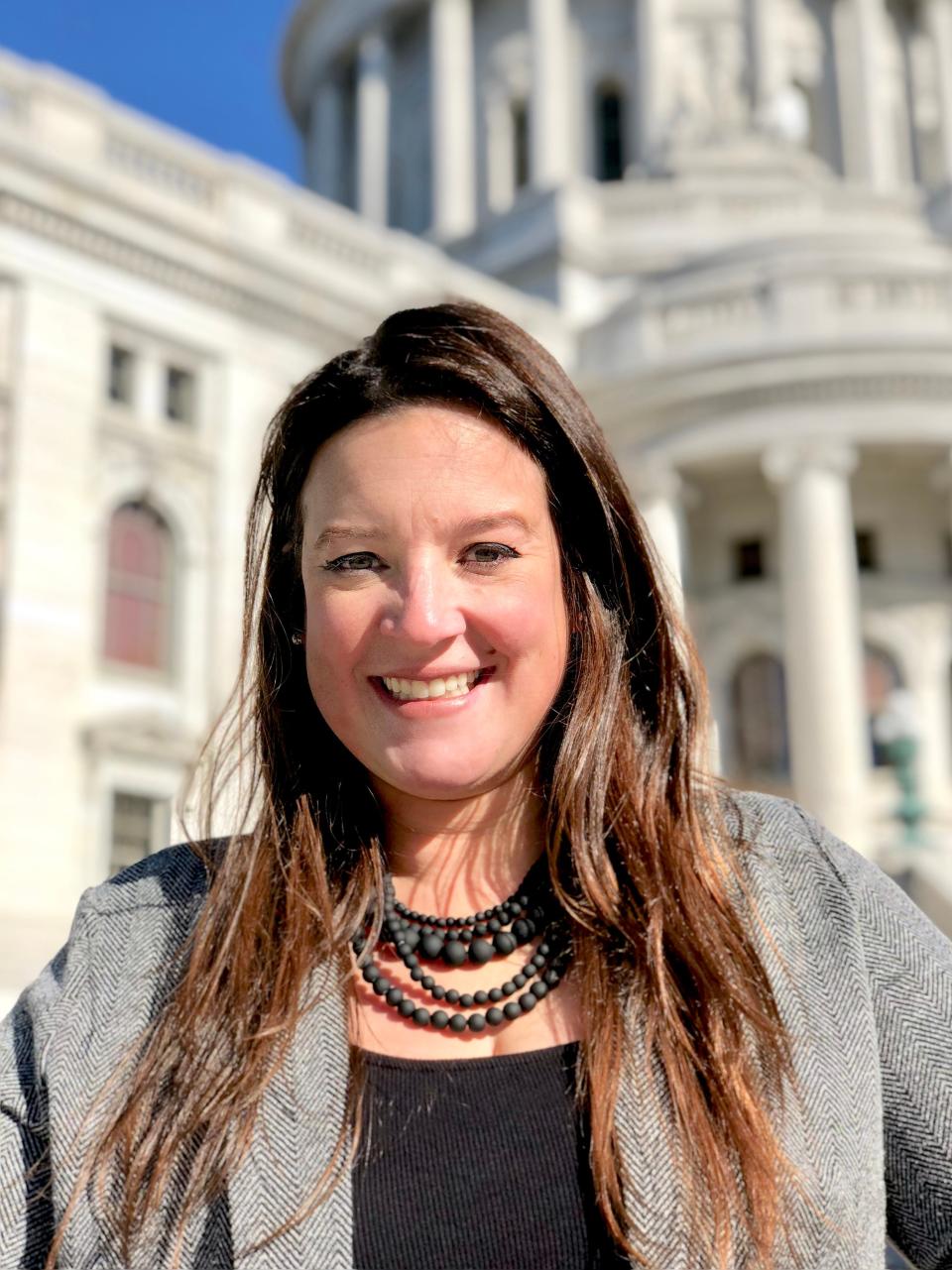Bice: Evers says it's nobody's business if supervisors in his office date subordinates
- Oops!Something went wrong.Please try again later.
Both houses of the state Legislature have strict policies prohibiting supervisors from having consensual romantic relationships with subordinates, noting the potential for legal and ethical concerns, or sexual harassment claims that could be paid for by taxpayers.
Each of the University of Wisconsin campuses has detailed guidelines governing such situations, as do many corporations around the country, especially since the #MeToo movement brought to light the widespread abuses of power by those in leadership positions.
"I would think it'd be wise … to prohibit romantic relationships within the chain of command," said Joshua Goodbaum, a leading employment and labor attorney based in Connecticut who has sued many employers over failed office romances. "It's just a recipe for disaster in my view."
But this doesn't seem to be a concern in the highest office in state government.

Gov. Tony Evers acknowledged that his office doesn't restrict supervisors from engaging in consensual romantic relationships with the staffers they oversee. Evers, a second-term Democrat, said he keeps a close eye on what is going on in his office, which has some 37 employees.
"It's a small group of people, and I monitor their performance on a regular basis," Evers said. "One of my jobs as governor is to monitor the performance of my staff, and I believe they are doing a good job."
But a handful of Democrats have spoken to the Journal Sentinel in recent weeks to express their concerns that Maggie Gau, Evers' powerful chief of staff, is — from all appearances — in a longtime romantic relationship with another senior employee whom she directly supervises.

Evers refused to discuss that particular situation on Tuesday during a stop at Greenwood Junior-Senior High School in Clark County.
"I don't think it's anybody's goddamn business," Evers said. "That's the bottom line."
Sources said the relationship was creating a difficult environment in Evers' office, especially because they believe no one can raise concerns to Gau about her partner. Asked about this, the governor said, "That's not accurate. It's as simple as that. No way."
Last week, in response to questions from the Journal Sentinel Evers' office issued a 1,300-word response when asked if Gau was in a romantic or sexual relationship with a particular subordinate on her staff. The statement skirted the issue of whether the pair of Evers' employees are dating.
The two staffers have lived together for at least a couple of years, according to state records. Sources close to the pair say the two are very private individuals but that their relationship is a "poorly kept secret."
"Our office does not comment on the marital status, religion, ancestry, sexual orientation, etc., of employees because we respect the dignity, humanity, and privacy of each member of our team, and because doing so could, in many circumstances, create legal liability," said the statement from Evers' office.
The statement went on to say that the subordinate was appointed to a deputy's position at a pay of $62,000 a year in January 2019, a position that did not report directly to Gau but was still under her chain of command. The staffer was promoted by Evers to a top-level position that does report to Gau on Nov. 8, 2020, with an annual salary of $100,006. That pay was boosted to $112,008 per year in January — an 80% pay increase in four years.
"Every state employee receives general wage adjustments as part of the state compensation plan, which is approved by the Wisconsin State Legislature," the statement said.
That statement did not make clear what Gau's role was in promoting the staffer. But it did say the staffer had been passed over for a promotion on three occasions and made $10,000 less than two predecessors when recently promoted to the top-level post. The staffer now makes the same salary as the previous person in the post.
"The office of the governor is organized, structured, and managed for the purposes and benefit of the governor: meeting his needs and achieving his administration’s priorities," the statement said.
"Any potential for conflicts, harassment, or legal concerns are evaluated on an individual basis based on the facts of any given situation," it continued. "Further, it is the governor’s expectation that staff comply with all applicable Wisconsin statutes, ethics rules, and any other policies applicable to staff in our office."
Gau was asked specifically via email if she was in a romantic relationship with a staffer she supervises. She responded: "Per your last request, our office already provided on-the-record responses to your questions. We will continue to refer you to those responses."
Relationships between supervisors, subordinates raise questions of favoritism, conflicts of interest
Vanessa Bohns, a professor of organizational behavior at Cornell University, has written that a growing number of institutions have clamped down on office romances between supervisors and subordinates, especially in the wake of the #MeToo movement.
Overall, Bohns wrote, nearly 80% of human resources executives said in 2018 that their employers had formal policies that "didn’t allow relationships between managers and direct reports." Universities and colleges are also taking steps to prohibit relationships between faculty and students or other similar situations.
That is the case in Wisconsin.
The University of Wisconsin System has a formal policy aimed at ending conflicts of interests "when UW employees, students, and affiliated individuals, in positions of unequal power, are involved in consensual romantic or sexual relationships."
The policy notes that "such relationships create an environment charged with potential or perceived conflicts of interest and possible use of academic or supervisory leverage to maintain or promote the relationship."
"Romantic or sexual relationships that the parties may view as consensual may still raise questions of favoritism, as well as of an exploitative abuse of trust and power," the policy states.
If an employee in a supervisory position begins a consensual relationship with a subordinate, the supervisor is to report the situation to the department chair or hiring official. The supervisor then must "cooperate in actions taken to eliminate any actual or potential conflicts of interest and to mitigate adverse effects on the other employee."
"If an instructor or other employee fails to meet the requirements for disclosing the relationship with a student or another employee, or fails to cooperate in the actions described above, such a failure constitutes a violation of this policy and may result in disciplinary action taken against that employee," the policy states.
Both houses of the Legislature have even stricter prohibitions on consensual relationships between supervisors and subordinates.
In the Assembly, the policy says "sexual, romantic or intimate relationships" between supervisors and subordinates that appear to be consensual and welcome may still constitute sexual harassment. Furthermore, the Assembly policy states that such relationships "may give rise to legal and ethical concerns or a conflict" between personal and official interests.
"Relationships between supervisors and subordinates are not allowed in the Assembly," states the 51-page policy manual. "Supervisors involved in such relationships have the obligation to remove themselves from the consensual relationship."
The Senate manual offers the same conclusion, simply inserting "Senate" for "Assembly" in the final paragraph.
Employment attorneys say office relationships carry legal risks
Employment attorneys said managers should be strongly discouraged from having a relationship with a subordinate because of the potential for sexual harassment claims or discrimination complaints.
Pamela Ploor, a lawyer with the Stafford Rosenbaum firm in Milwaukee, said these relationships create the impression that workers won't land a plum assignment or receive a promotion unless they engage in a romantic relationship with the boss.
This can have a ripple effect throughout the workplace.
The risks are compounded, Ploor said, when a romantic relationship between a staffer and supervisor ends on bad terms. She said half of marriages end in divorce, and the rate is even higher for workplace romances.
"When things go bad you know, people don't always act their best," Ploor said. "People get emotional and act out in the workplace. That's a recipe for some risk for an employer."
These problems can occur in small or large employers.
In the past, Ploor noted, major firms like McDonald's and CNN have ousted top officials over undisclosed office romances.
In Milwaukee, former Mayor John Norquist was forced from office and settled a sexual harassment complaint with a former employee for $375,000 in 2002. The staffer contended what began as a consensual sexual relationship turned into sexual harassment when she tried to break things off.
More recently, Maine Attorney General Aaron Frey acknowledged that he has been in a relationship with a worker whom he supervised for months, and he said his delay in disclosing it was an “error in judgment.” His office had no policy on consensual relationships.
Goodbaum said even a consensual relationship with a boss can create problems for a worker and others in the workplace. These relationships can lead to a sense of favoritism or alienation. Coworkers might conclude the subordinate is also protected from disciplinary action.
He said the real problem occurs when the relationship between a supervisor and a staffer goes south.
In many of these, he said, the supervisor tries to win back over the subordinate, leading to a claim of sexual harassment. Other times, he said, the boss does something that the former romantic partner doesn't like and interprets as retaliatory.
"Even putting aside the legal risk, it can just create really awkward dynamics and workplaces where you've got two people who used to be in a serious relationship and now they have trouble communicating or even sharing a space," Goodbaum said.
Janet Heins, a Milwaukee-area labor lawyer, said it's not enough simply to have a policy on consensual relationships. She said she has sued many employers for their poor handling of these matters even with a policy.
Some firms interpret the policies to require them to fire the subordinate, who is usually a woman. She said this is a "bad idea."
"Worse, some employers fire both parties, especially if the relationship was required to be disclosed but wasn't," Heins said. "Also bad is selective enforcement — at higher levels but not lower levels (or vice versa)."
So are all office romances to be avoided altogether?
Goodbaum said he primarily sees situations in which these relationships have ended poorly. But he said he has a word of advice to those thinking about dating someone they oversee.
"If a manager came to me and said, 'Hey, I'm really romantically interested in a subordinate of mine,' I would say, 'Then you need to decide whether you want to pursue this relationship or leave your job. And if you really have this firm conviction that this person who reports to you is your soulmate, then maybe you should think about trying to get that person out of your chain of command without doing anything negative to them,'" he said.
Goodbaum concluded: "Trying to date somebody who works for you is really awkward, really tough, fraught with risk, and most employers would not tolerate it."
Contact Daniel Bice at (414) 313-6684 or dbice@jrn.com. Follow him on Twitter @DanielBice or on Facebook at fb.me/daniel.bice.
THANK YOU: Subscribers' support makes this work possible. Help us share the knowledge by buying a gift subscription.
DOWNLOAD THE APP: Get the latest news, sports and more
This article originally appeared on Milwaukee Journal Sentinel: Evers won't discuss gov's office supervisor-subordinate relationships

